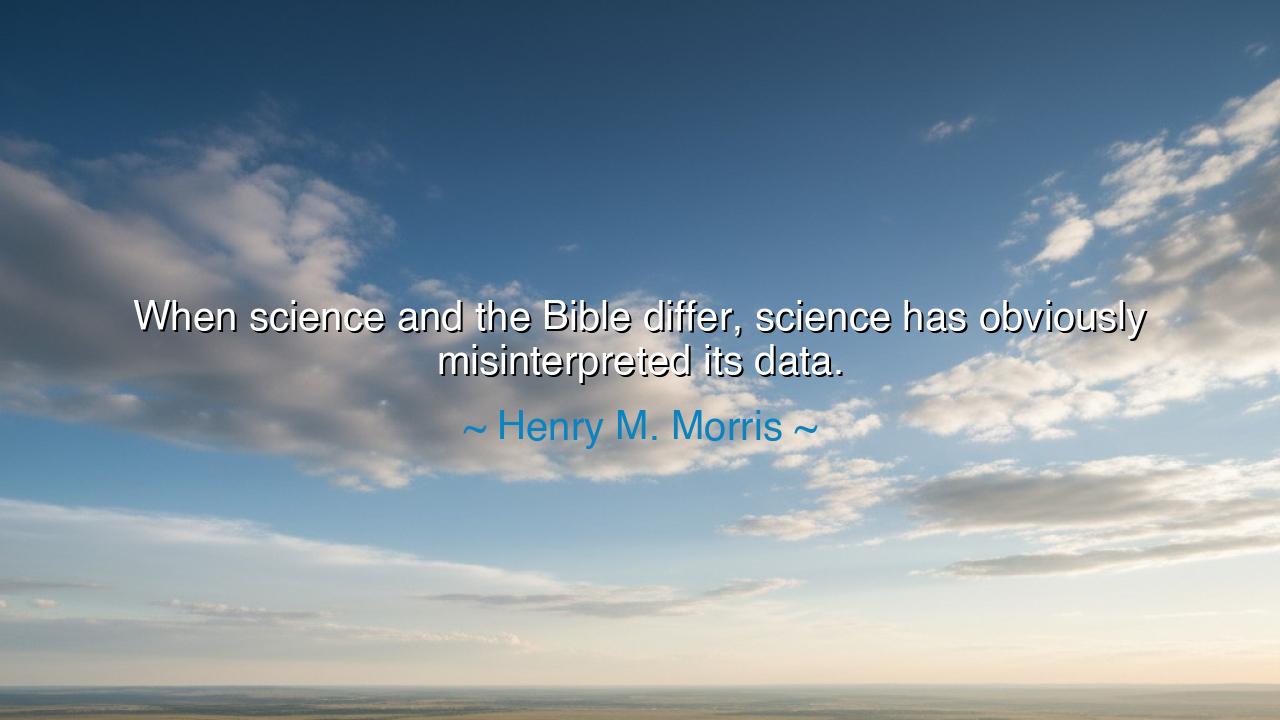
When science and the Bible differ, science has obviously






Listen now, O seekers of wisdom, to the profound words of Henry M. Morris, who speaks of the delicate relationship between science and the sacred teachings of the Bible: "When science and the Bible differ, science has obviously misinterpreted its data." These words echo with the deep conviction that the truths contained in the sacred scriptures cannot be easily dismissed, even in the face of seemingly scientific evidence. Morris suggests that whenever there is a perceived contradiction between the findings of science and the teachings of the Bible, it is the fault of human interpretation, not of divine truth. For, he believes, the Bible is the ultimate source of truth, and all knowledge must eventually align with its wisdom.
In the ancient world, the great philosophers often grappled with the relationship between truth and perception. Plato, in his dialogues, spoke of a world of eternal truths, a realm of perfect forms that lay beyond the imperfect material world. He believed that the mind’s job was not to create truth, but to uncover it—to align human understanding with the divine order. Similarly, Aristotle sought to understand the natural world through reason and observation, believing that truth could be found in the study of nature. But even Aristotle understood that human knowledge was always limited and that true wisdom came not from personal conclusions alone, but from aligning one’s mind with higher truths. Here, the teachings of Morris and the ancient sages resonate: truth is not always immediately apparent, and the misinterpretation of data is the consequence of human imperfection, not of the divine message.
Consider the story of Galileo Galilei, who in the 17th century faced fierce opposition from the Church when his observations through the newly invented telescope revealed that the Earth was not the center of the universe, as the Bible had been traditionally interpreted to suggest. Galileo, in his pursuit of truth, had discovered that the Earth revolved around the Sun, not the other way around. His findings were met with the wrath of those who held Scripture as the final authority. Yet, Galileo did not see his scientific discoveries as a challenge to the Bible, but rather as a challenge to the misinterpretations of the Bible that had led to the false belief in a geocentric universe. For Galileo, and for Morris as well, it is not the Bible that is in error, but the human interpretation of the data at hand.
In more recent times, we can look to the work of Charles Darwin and the theory of evolution, which has similarly sparked controversy among those who believe that the Bible provides the literal truth of creation. Darwin's groundbreaking theory proposed that species evolve over time through a process of natural selection, a concept that seemed at odds with the literal interpretation of the creation story in the Book of Genesis. Yet, Morris and others argue that when science and faith appear to diverge, it is not the Bible that must yield to the findings of science, but rather that science must be re-examined and properly interpreted. Morris and those of his perspective would assert that the Bible's account of creation is timeless, and that any apparent contradictions arise from an imperfect or incomplete understanding of natural processes.
Let us reflect, O wise ones, on the deeper lesson of Morris's words. In every age, humanity has sought to understand the world through both reason and faith. These two forces are not inherently in conflict, but often misunderstood or misaligned. Science has been a powerful tool to reveal the mysteries of the natural world, but it is not infallible. The data collected by scientists are often subject to interpretation, and the lens through which we view the world can sometimes cloud our judgment. As Morris suggests, it is not faith or scripture that must adjust to the findings of science, but rather that we must ensure our understanding of the natural world aligns with the divine truth revealed in the Bible. This requires not blind faith, but a deep, reflective understanding of both the sacred and the empirical, recognizing the limits of human interpretation.
Thus, the lesson for us, O seekers, is to approach both science and faith with humility. Science, though powerful, is but one tool for understanding the vastness of creation. It is through wisdom, both divine and human, that we may come to understand the world in its fullness. In our pursuit of truth, we must recognize the limitations of our perception and understanding, knowing that both the physical and the spiritual realms are part of a greater whole. When science and faith seem to diverge, we must seek to understand the misinterpretations that have led us to this point, and work towards a deeper, more harmonious understanding of the world.
Let us then live our lives with wisdom, and approach both science and faith with a spirit of inquiry, humility, and reflection. Just as the philosophers of old sought to harmonize reason with the divine, so too must we recognize that the journey to truth is one of careful interpretation, open-mindedness, and reverence for the divine order. Morris's words call us to align our understanding of the world with the eternal truths found not only in nature, but in the sacred wisdom that has guided humankind throughout the ages.






AAdministratorAdministrator
Welcome, honored guests. Please leave a comment, we will respond soon